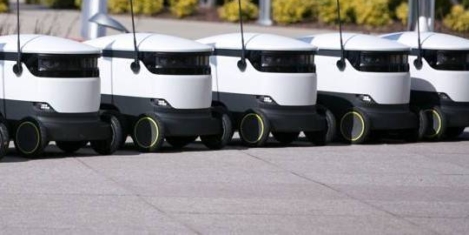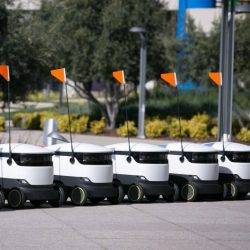May 14, 2018
Manchester incubator aims to develop region’s strength in tech and research
 Manchester Science Partnerships (MSP) has opened its new £2m tech incubator which it hopes will help create up to 2,000 jobs in data science and technology innovation companies over the next decade. Reflecting the ambitions of the updated Greater Manchester strategy to build on the city region’s strengths in technology and digital innovation, the incubator will provide start-ups with a wide package of business support services including: access to finance, talent and markets advice. Manchester is already a European top 20 digital city and this new incubator is designed play a role in strengthening the city’s status as a location for technology businesses over the coming years.
Manchester Science Partnerships (MSP) has opened its new £2m tech incubator which it hopes will help create up to 2,000 jobs in data science and technology innovation companies over the next decade. Reflecting the ambitions of the updated Greater Manchester strategy to build on the city region’s strengths in technology and digital innovation, the incubator will provide start-ups with a wide package of business support services including: access to finance, talent and markets advice. Manchester is already a European top 20 digital city and this new incubator is designed play a role in strengthening the city’s status as a location for technology businesses over the coming years.






 Companies will need more, not less people, in the near-term to meet the demand stimulated by automation, claims a new report from ManpowerGroup. The report – Robots Need Not Apply: Human Solutions in the Skills, found that 91 percent of employers in the US will maintain or increase headcount in the next two to three years as industries shift to more advanced, automated processes. The report provides a real-time view of the impact of automation on headcount, the functions most affected and the soft skills that are both of greatest value and hardest to find. Frontline and Customer-Facing functions anticipate the most growth as organisations place higher value on customer service and human interaction. Manufacturing and Production functions are close behind. Back-office functions that are routine or add less value to customer interactions are under greatest threat as organisations implement new technology to drive efficiency. In this Skills Revolution the best blend of high-tech and high-touch will be the combination of human strengths with technical and digital know-how: 61 percent of companies say communication skills, written and verbal, are their most valued soft skill followed by customer service, collaboration and problem-solving.
Companies will need more, not less people, in the near-term to meet the demand stimulated by automation, claims a new report from ManpowerGroup. The report – Robots Need Not Apply: Human Solutions in the Skills, found that 91 percent of employers in the US will maintain or increase headcount in the next two to three years as industries shift to more advanced, automated processes. The report provides a real-time view of the impact of automation on headcount, the functions most affected and the soft skills that are both of greatest value and hardest to find. Frontline and Customer-Facing functions anticipate the most growth as organisations place higher value on customer service and human interaction. Manufacturing and Production functions are close behind. Back-office functions that are routine or add less value to customer interactions are under greatest threat as organisations implement new technology to drive efficiency. In this Skills Revolution the best blend of high-tech and high-touch will be the combination of human strengths with technical and digital know-how: 61 percent of companies say communication skills, written and verbal, are their most valued soft skill followed by customer service, collaboration and problem-solving.
 A third of UK office workers (30 percent) have admitted to only completing 1-4 tasks every day, according to a new report from Fellowes, which claims productivity levels in offices across the UK have fallen to a dramatic low. A quarter of workers admit they are unproductive for up to two hours a day, equating to a staggering 40 million-hours in lost productivity across the UK every week. Compared to data from Fellowes in 2017, the average office worker has lost an extra 30 minutes each day to productivity issues., office product specialists, released their second Productivity in the UK report today to help businesses understand what their employees need to increase output and the tools that can help. The study also found that over a third (38 percent) of office workers felt their employers weren’t doing enough to help their productivity and nearly half (40 percent) even went as far as to say they were more productive than their boss. On average Brits failed to meet deadlines at least once a week and 65 percent think a four-day working week would improve productivity.
A third of UK office workers (30 percent) have admitted to only completing 1-4 tasks every day, according to a new report from Fellowes, which claims productivity levels in offices across the UK have fallen to a dramatic low. A quarter of workers admit they are unproductive for up to two hours a day, equating to a staggering 40 million-hours in lost productivity across the UK every week. Compared to data from Fellowes in 2017, the average office worker has lost an extra 30 minutes each day to productivity issues., office product specialists, released their second Productivity in the UK report today to help businesses understand what their employees need to increase output and the tools that can help. The study also found that over a third (38 percent) of office workers felt their employers weren’t doing enough to help their productivity and nearly half (40 percent) even went as far as to say they were more productive than their boss. On average Brits failed to meet deadlines at least once a week and 65 percent think a four-day working week would improve productivity.


 Organisations are failing to get the basics right when it comes to providing the digital and virtual systems that support employees in their roles, despite an evolving technological landscape and rise in flexible working, a new report has claimed. Data released by Leesman analyses how organisations can better support employees by offering the technology tools and infrastructure that enable people to work in a flexible way. In Deloitte’s 2018 Tech Trends report issued at the beginning of 2018, there was a heightened focus on how disruptive technologies will help businesses achieve larger strategic and operational goals and drive greater value. It predicted that within the next two years, more companies will embrace the emerging ‘no-collar workforce’ trend by redesigning jobs and reimagining how work gets done in a hybrid human-and-machine environment. However, Leesman’s findings show that, as of yet, organisations are failing to get the digital basics right. According to its latest dataset (Q1 2018) 23 percent do not agree that they have the technology tools and infrastructure that enable them to work in different locations across the office or from different locations outside of the office.
Organisations are failing to get the basics right when it comes to providing the digital and virtual systems that support employees in their roles, despite an evolving technological landscape and rise in flexible working, a new report has claimed. Data released by Leesman analyses how organisations can better support employees by offering the technology tools and infrastructure that enable people to work in a flexible way. In Deloitte’s 2018 Tech Trends report issued at the beginning of 2018, there was a heightened focus on how disruptive technologies will help businesses achieve larger strategic and operational goals and drive greater value. It predicted that within the next two years, more companies will embrace the emerging ‘no-collar workforce’ trend by redesigning jobs and reimagining how work gets done in a hybrid human-and-machine environment. However, Leesman’s findings show that, as of yet, organisations are failing to get the digital basics right. According to its latest dataset (Q1 2018) 23 percent do not agree that they have the technology tools and infrastructure that enable them to work in different locations across the office or from different locations outside of the office.





 There have already been warnings from workplace experts that the legal profession isn’t one to choose for those starting out on their careers as it’s ripe for automation, and a new survey claims these changes are happening fast. According to a survey of over a 100 law firms by CBRE, nearly half (48 percent) are already utilising Artificial Intelligence (AI) and a further 41 percent have imminent plans to do so. Of the firms already employing AI, 63 percent of firms are using it for legal document generation and review, and the same proportion for e-discovery. Due diligence (47 percent) and research (42 percent) were also common applications, along with compliance and administrative legal support (each 32 percent). The use of AI will affect employment levels, with the greatest impact predicted at the junior and support levels, where nearly half (45 percent) of firms believing that there will be a reduction in headcount. In contrast, only 7 percent of firms believe that senior headcount levels will be reduced.
There have already been warnings from workplace experts that the legal profession isn’t one to choose for those starting out on their careers as it’s ripe for automation, and a new survey claims these changes are happening fast. According to a survey of over a 100 law firms by CBRE, nearly half (48 percent) are already utilising Artificial Intelligence (AI) and a further 41 percent have imminent plans to do so. Of the firms already employing AI, 63 percent of firms are using it for legal document generation and review, and the same proportion for e-discovery. Due diligence (47 percent) and research (42 percent) were also common applications, along with compliance and administrative legal support (each 32 percent). The use of AI will affect employment levels, with the greatest impact predicted at the junior and support levels, where nearly half (45 percent) of firms believing that there will be a reduction in headcount. In contrast, only 7 percent of firms believe that senior headcount levels will be reduced.


















May 1, 2018
No surprises in new report on future workplace trends
by Mark Eltringham • Comment, Flexible working, Technology, Wellbeing, Workplace design
More →